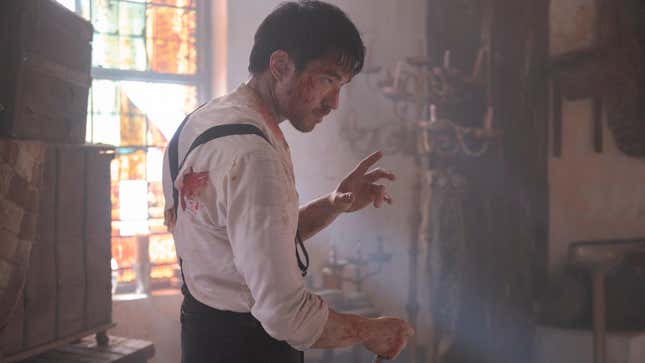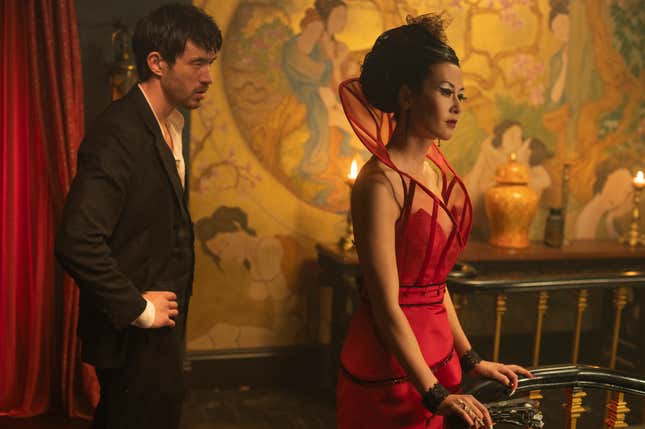
More than two and a half years after being unceremoniously canceled on Cinemax, Warrior, the gritty, pulpy martial-arts crime drama set during the brutal Tong Wars in late 19th-century San Francisco, has risen from the ashes and returned with a vengeance for a long-awaited, jam-packed third season, which premieres June 29 on Max. Picking up in the aftermath of the race riots between the Chinese and the Irish that upended Chinatown, the latest chapter of the criminally underrated series continues to offer incisive insights into the Chinese American experience while bringing multiple conflicts, which could change the perilous power balance in the city, to a head.
After playing a pivotal role in holding back the Irish onslaught in the season-two finale, protagonist Ah Sahm (Andrew Koji)—who first crossed the Pacific in search of his sister, only to be forced into one of the Tongs and discover that she is part of a rival gang—finds himself playing the role of a local legend in Chinatown, complete with a massive new portrait painted on the side of a building. But all of that attention does not preclude him from feeling the squeeze of a heightened police presence in the area. With the cops enforcing a bevy of cruel ordinances targeting Chinese workers and businesses, the Tongs, as well as the larger Chinese immigrant population, are becoming increasingly desperate and looking for new ways to survive—and tensions are running high on all fronts.
As the new leader of the Hop Wei, Young Jun (Jason Tobin) begins to question not only his own ability to assume the mantle once occupied by his domineering father (Perry Yung) but also the loyalty of his right-hand man, Ah Sahm, whom he recently discovered is the estranged brother of Mai Ling (Dianne Doan), the no-nonsense leader of the rival Long Zii. While her subordinates worry about fighting in turf wars, Mai Ling has set her sights on consolidating her power in Chinatown and beyond. She is still in cahoots with Walter Buckley (Langley Kirkwood), the acting mayor of San Francisco who has been keeping the police off the back of the Long Zii. Speaking of the police, Sgt. Bill O’Hara (Kieran Bew) isn’t as close to the chief’s job as he thinks he is, and Richard Lee (Tom Weston-Jones) is still hellbent on not returning to his post at the San Francisco Police Department, but he can’t resist a call to investigate counterfeit bills that pop up in Chinatown.
Despite the warnings of her lover Li Yong (Joe Taslim), whose own loyalty and ability to protect her this season will be tested, Mai Ling believes that she can use her allure as an Asian woman to join the inner circles of white women and go into business with their husbands. Ah Toy (Olivia Cheng), the madam of a Chinatown brothel who was seriously injured at the end of last season before Mai Ling unexpectedly came to her aid, continues to seek refuge with Nellie Davenport (Miranda Raison), a widowed white woman who has become her lover and offers asylum to Chinese migrants on her vineyard in Sonoma. Much like the first season, in which Ah Sahm has an affair with Penelope Blake (Joanna Vanderham), the stifled wife of the now-deceased mayor, the latest batch of episodes offers an interesting commentary on the limits of trying to align with whiteness in the Western world for non-white immigrants. It also underlines the reality that, despite speaking the same language and having the same needs and wants to build a life for themselves, many of them are still considered “less American” than their white counterparts. (In that same vein, the show asks the question: “Who gets to decide who is truly American?”)

Warrior’s greatest strengths have always lied in its ability to combine deft social commentary, such as the parallels that could be drawn between the racist and xenophobic attitudes of 19th-century San Francisco in the show and the alarming spike in anti-Asian attacks during the Covid-19 pandemic, with high-octane fight sequences, which have only gotten better year after year. And while it could easily try to paint the Chinese as the victims of this story, the show fleshes out the motivations of the other warring factions—the shifty politicians, the corrupt cops, the working-class Irish (led by Dean Jagger’s Dylan Leary, who is back to being more of a gangster this season)—to the point where viewers are at least forced to consider where they are coming from and how the exploitation of the working class has further intensified these attitudes. But given that Warrior has never shied away from showing the uglier parts of American history to craft a compelling narrative, there is still something particularly cathartic about watching the Chinese characters fight back in real time and rail against those pervasive and entrenched racist attitudes about their people. (The riots in the season-two finale may be the first and last time we see any kind of solidarity across Tongs, so it’s always a treat when they’re able to team up against a common enemy who isn’t Chinese.)
Having starred in Bullet Train and Snake Eyes in between seasons, Koji returns to the show with a cool and quiet confidence that may just be a result of him feeling more comfortable in his own skin as an actor. Along with Tobin and Taslim, Koji continues to bring remarkable verve and effervescence to each of his fights that demand full-body contact and commitment, and stunt coordinator Brett Chan continues to find new ways and places for these characters to fight while finding little beats in the fights to show their humanity and motivations. Although Ah Toy does not pick up a sword as much this season, Cheng continues to imbue the role with a mix of ferocity and vulnerability in her fight scenes that makes her one of the show’s most exciting and enigmatic characters, even if she feels more underused and underserved this time around outside of her storyline with Nellie.
Although the middle of the season loses some narrative steam and frustratingly places less of an emphasis on the combative sibling relationship between Ah Sahm and Mai Ling (which is one of the cornerstones of the show and a major source of conflict between the Tongs), the final episodes reset the power balance in Chinatown with broken and newly formed alliances and a shockingly high body count. It remains to be seen if the cast and writers will be given an opportunity to explore that new power dynamic, particularly with the show hurdling toward the egregious Chinese Exclusion Act of 1882, but one thing is for certain: Warrior still knows how to pack a punch.
Warrior season three premieres June 29 on Max